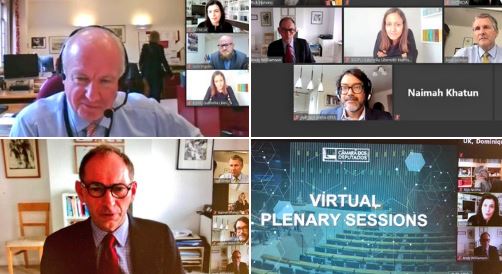

IPU and global parliamentary IT experts brief UK Peers on COVID-19 responses
BGIPU hosted a roundtable on Parliamentary IT responses to COVID-19 on Tuesday 8 September. BGIPU Director Rick Nimmo moderated the session which was attended by Lord Russell, Lord Clement-Jones, on behalf of the House of Lords IT Users group. Through the assistance of the IPU Centre for Innovation in Parliament, a panel of experts comprised Dr Andy Williamson, Senior Researcher, Centre for Innovation in Parliament, IPU; Patricia Almeida, Coordinator of Digital Innovation and Strategy, Brazil Chamber of Deputies; Juris Vīgulis, Head of the Saeima Public Relations Department, Latvia Saeima; and José Ángel Alonso, ICT Director, Senate of Spain
The meeting discussed a range of issues related to the experiences and key points of learning experienced in individual parliaments and collectively through knowledge-sharing through IPU networks of parliamentary IT experts including the main trends in Parliaments moving to remote working in response to COVID-19 including that many common solutions had been found but there were differences in implementation due to each parliament’s own traditions, requirements including with regard to security and differing resources. Clear differences in capabilities was often overcome by knowledge-sharing of best practices and solutions between experts.
The discussion also asked how Parliaments have cooperated internationally on sharing best practice and innovative solutions, noting the key role of the IPU and networks associated with its e-Parliament hubs which had been vital in ensuring information sharing and dialogue on key solutions being implemented in particular national contexts. The IPU’s own experts have been collating the broader lessons learned and supporting these networks. Some pre-existing regional and bilateral networks also key. Another key point was to explore the main challenges in establishing electronic voting mechanisms for Parliament with experts noting that security and trust in providers and willingness to change processes by administrations themselves are some of the obstacles but the technical challenges were largely overcome in most cases due to the urgency to address needs and ensure parliaments remained fully functioning, underscoring the vital public functions they undertake particularly in times of crisis.
Finally there was discussion on what parts of the measures introduced in response to COVID-19 are likely to lead to permanent changes in the ways Parliaments operate or would parliaments just revert back once the pandemic subsides? it was agreed that video conferencing was likely to play a larger role in parliaments in the future, including in terms of evidence and expert hearings and there was recognition that IT changes can be done at speed in response to a crisis, albeit side-stepping the usual administrative checks and balances. There was recognition that the COVID-19 crisis had prompted many new ways of looking at how parliaments operate – including involving technical experts in close cooperation with parliamentary administrations and parliamentarians themselves, looking outside the envelope and questioning some long-established practices which had been very productive despite the difficult circumstances.






